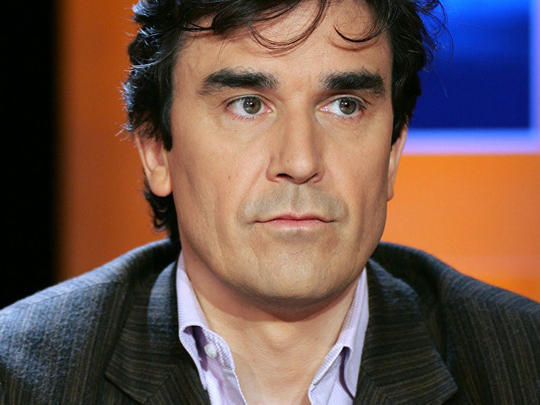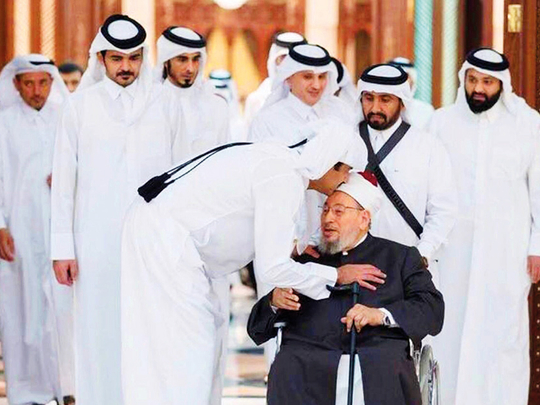 EXCLUSIVE
How Qatar funds Muslim Brotherhood expansion in Europe
Gulf News interviews French author George Malbrunot on his recent book Qatar Papers
April 17, 2019
Sami Moubayed, Correspondent
https://gulfnews.com/world/gulf/qatar/h ... 1.63386835
EXCLUSIVE
How Qatar funds Muslim Brotherhood expansion in Europe
Gulf News interviews French author George Malbrunot on his recent book Qatar Papers
April 17, 2019
Sami Moubayed, Correspondent
https://gulfnews.com/world/gulf/qatar/h ... 1.63386835
 George Malbrunot
Beirut
George Malbrunot
Beirut: Ninety per cent of Qatari funds to the EU were channeled to Muslim Brotherhood-affiliated projects, two French authors have confirmed, supporting claims made since the summer of 2017 by Saudi Arabia and the UAE.
One of the authors—prominent investigative journalist
George Malbrunot—spoke to
Gulf News about his new book
Qatar Papers: How the State Finances Islam in France and Europe.
It has been co-authored with his colleague
Christian Chesnot, a ranking expert on the Arab World.
This is not fantasy,
Malbrunot said in an exclusive interview.
The evidence we published was based on bank transfers, cheques, and official letters. It is evidence that they simply cannot contest.
A total of 140 projects spread in Europe—mainly mosques and Islamic centers—were directly funded by Qatar over the past eight years.
-
George Malbrunot, journalist
The two journalists started working on their 295-page book in late 2016, after receiving an information-packed USB from a whistleblower, filled with documents from database of the
Qatar Foundation, headed by
Shaikha Moza Bint Nasser Al Misned, and
Qatar Charity, headed by a relative of her son, the Emir, Sheikh
Hamad Bin Nasser Al Thani.
Much of the funding came from
Qatar Charity, an NGO that was set up in 1992 originally to help orphans from the Afghan War, then expanded horizontally and vertically across the globe, with the lion’s share of its activities focused on Europe.
A total of 140 projects spread in Europe—mainly mosques and Islamic centers—were directly funded by Qatar over the past eight years,
he said.
Their activities spread across territory from north of Norway to the coast of Normandy, France, totaling 90 million Euros.
Ninety per cent of that activity was linked to Muslim Brotherhood-affiliated organisations through a system that is very efficient, sophisticated — and legal,
he added.
Much of the funding came from three sources: the Diwani Al Amiri, office of the former emir, Hamad Bin Khalifa Al Thani, and the Qatar Charity.
Qatar wants to buy influence in Europe,
explained Malbrunot, making use of its excessive wealth, which transformed it from a “country of fishermen” into a world influencer.
Ultimately, Doha would like to control and influence Islamic societies across the European continent,
a task previously handled by Morocco, Algeria, Turkey, or Saudi Arabia.
Stunning revelations
An ever-present thread in the book’s revelations are links to the Brotherhood—outlawed throughout most of the world for its links to global jihad and terrorism.
One document shows that the Qatar Foundation pays Tarek Ramadan (grandson of the Brotherhood’s founder Hasan Al Banna) a monthly salary of 35,000 euros (Dh145,521).
The amount was allocated to help Ramadan ward off accusations of rape and sexual misconduct, levied against him in November 2017.
They prompted him to leave his academic job as professor at the University of Oxford, relocating to Doha where he now teaches at the Hamad Bin Khalifa Al Thani University and chairs the Research Center of Islamic Legislation in Qatar.
Before his trial, Ramadan withdrew 590,000 euros from Qatari banks, allegedly for his defense team.
Research for the book took Mablrunot and Chesnot to Switzerland, the UK, Germany, Kosovo, France — and Qatar of course.
In the island of Jersey in the English canal, Qatar set up a mosque,
although there are no more than 400 people living there.
In northern France, they donated hefty sums to the
Ibn Rushd School in the city of Lille, and also to another private school in the southern city of Bordeaux.
They also financed 50 similar projects in Italy, and channeled 3.6 million euros to Switzerland between the years 2011-2014.
They were used to fund the Muslim Cultural Complex of Lausanne, the Museum of Islamic Civilisation in La Chaux-de-Fonds in the canton of Neuchâtel, and the Saladine Mosque in Bienne (canton of Bern).
The Muslim Brotherhood philosophy is to encompass people’s lives from birth to death. All of the Qatar-financed projects tried to do just that, surrounding mosques with schools, swimming pools, restaurants, and even morgues.
When we spoke with people administering these centers, they would say: ‘We are not members of the Brotherhood. All of our funding is 100 per cent legal.
Yet, when we entered the libraries of these mosques and schools, we found the books of Shaikh Yousuf Al Qaradawi (the Doha-based Egyptian mentor of the Brotherhood). His books were everywhere, and so were those of Sayyid Qutob (one of the historic leaders of the Egyptian Brotherhood).
International pressure on Doha
After years of (presidents) Sarkozy and Holland, Emanuel Macron said that he has had enough. When Emir Tamim called him to congratulate him on his election, the French President said: ‘I will keep the partnership with Qatar, but I don’t want financing of any future project without my knowledge.”
Qatar, he notes, came under immense pressure to change its behaviour after its standoff with GCC countries in mid-2017.
Saudi Arabia, the UAE, Bahrain and Egypt severed ties with the country on June 5, accusing it of backing the Muslim Brotherhood and promoting extremist ideology.
In some cases, it complied, but in others, it tried to play a double game, like closing the London headquarters of Qatar Charity, then re-opened with a rebrand, being Nectar Trust. It just dropped the word ‘Qatar’ from its name.
Mabrlunot and Chesnot rose to global fame in 2004, when they were held captive for five months in Iraq by the
Islamic Army. It is their third book on Qatar after
Les secrets du coffre-fort (Secrets of the Safe, 2013) and
Nos tres chers emirs (Our Very Dear Emirs, 2016). Next September, they will be releasing a documentary about their new book, providing a visual aid to Qatar Papers. It will be aired on Russia Today.
___________
_______________________
Qatar to sever ties with Brotherhood?
Analysts say expelling group from Qatar would be easier said than done
December 06, 2019
Sami Moubayed, Correspondent
 In this file picture, Qatari Emir Shaikh Tamim greets radical cleric Yousuf Al Qaradawi. Qatar has been hosting Al Qaradawi for several years.
In this file picture, Qatari Emir Shaikh Tamim greets radical cleric Yousuf Al Qaradawi. Qatar has been hosting Al Qaradawi for several years.
Image Credit: Gulf News Archive
Damascus: Qatar is willing to sever ties with the Muslim Brotherhood, according to The
Wall Street Journal (WSJ). In an exclusive report published in late November, the newspaper said that the Qatari foreign minister
Mohammad Bin Abdul Rahman Al Thani made an unannounced visit to Riyadh recently, hoping to end a two-year dispute with the Quartet. In exchange for lifting the blockade that was imposed in 2017, he offered to sever ties with the Muslim Brotherhood, an outlawed group considered a terrorist organisation by Saudi Arabia, the UAE, and Egypt.
The newspaper did not elaborate on the Qatari offer. Will the Brotherhood still be permitted to reside in Doha, but not have open access to the Royal Palace? It also made no mention of the group’s funding, Doha-based assets, and top officials, including the Brotherhood’s ideologue, the Egyptian Shaikh
Yousuf Al Qaradawi.
Al Jazeera confirms the story
Interestingly, no official statement came out of the Emir’s Diwan in Doha, but
Al Jazeera TV ran the
WSJ story, going a step further by quoting a senior Qatari official, without naming him. He was quoted as saying:
There has been a significant misunderstanding about Qatar’s relationship with specific political parties in the region,
in a clear reference to the Muslim Brotherhood.
This misunderstanding was mostly driven by orchestrated and paid campaigns targeting Qatar’s image. Our support has been sometimes misconstrued by those seeking to isolate Qatar, but the facts bear out our position.
The Muslim Brotherhood for Qatar is what nuclear weapons are to North Korea
said prominent Kuwaiti journalist
Fouad Hashem.
The group has relied on generous Qatari funding for years, sponsoring its activities in Egypt, Syria, and Palestine. Speaking to
Gulf News, Hashem added:
Likewise, a Qatar without the Brotherhood is a demilitarised Qatar. The Brotherhood were the source of its regional political influence.
Expelling them or curbing their influence in Qatar would be easier said than done, he added.
Giving diplomacy a chance
The Qatari Foreign Minister is the most senior official to visit Saudi Arabia since Prime Minister
Abdullah Bin Nasser Bin Khalifa Al Thani attended a summit in Mecca last May. Last month, the UAE, Saudi Arabia, and Bahrain revoked a decision to boycott the 24th Arabian Gulf Cup Football, giving diplomacy and engagement a chance.
Kuwaiti Deputy Foreign Minister
Khaled Al Jarallah said that the decision to participate in the football tournament was “clear indication” towards “progress.” And this week, Saudi King
Salman Bin Abdul Aziz invited Emir
Tamim Bin Hamad Al Thani to a GCC summit in Riyadh, scheduled for December 10, 2019.
It remains to be seen whether severing ties with the Brotherhood is enough to restore ties with Saudi Arabia, the UAE, Bahrain, and Egypt. The Quartet had originally outlined 13 points that they wanted Qatar to abide by, which included closing of Al Jazeera, which constantly hosts Brotherhood members at its studios, shutting down a Turkish military base, and severing ties with Iran. As recently as mid-November, Saudi Arabia had said that it was still waiting for answers to these demands.

